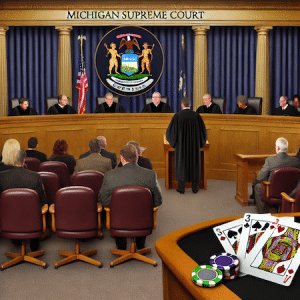The Michigan Supreme Court has agreed to hear an appeal in a lawsuit involving a woman who claims she was denied over $3 million in winnings by an online casino platform.
In 2023, a divided panel at the Michigan Court of Appeals decided that the claims made by Jacqueline Davis against BetMGM’s online gaming site were preempted by the Lawful Internet Gaming Act (LIGA). Davis’s account had been zeroed out, and her claims included fraud, conversion, and breach of contract.
Background and Initial Rulings
The dispute began in March 2021 when Davis hit a substantial win while playing the Luck O’ the Roulette game on BetMGM’s app. Shortly after, she withdrew $100,000 of her winnings at the MGM Grand Casino in Detroit. Following this, BetMGM flagged her account for unusual activity and suspended it, preventing her from accessing the remaining $3.2 million balance. The casino claimed that a game error had mistakenly credited her account, which led to the balance being reset to zero.
Davis’s attorney contacted BetMGM to request the release of the funds, but the operator insisted that the balance was the result of a platform malfunction and that Davis was not entitled to the remaining amount. Consequently, Davis filed a lawsuit in June 2021 in Wayne County Circuit Court, alleging fraud, conversion, and breach of contract.
Legal Proceedings and MGCB Involvement
A new meaning to the old gambling adage that the House always wins
In July 2021, Davis also filed a patron dispute with the Michigan Gaming Control Board (MGCB). Around the same time, BetMGM moved for summary disposition under MCR 2.116(C)(4), arguing that LIGA preempted Davis’s claims and that the MGCB had primary jurisdiction over the matter. The trial court sided with BetMGM, granting their motion for summary disposition on the grounds that LIGA preempted the claims.
Davis sought reconsideration, presenting a partially redacted letter from the MGCB to BetMGM’s CEO. The letter indicated that BetMGM had failed to comply with MGCB regulations, including notifying the board of malfunctioning games and informing the plaintiff of her right to file a complaint. Despite this, the trial court denied Davis’s motion for reconsideration, prompting her to appeal.
Appeals Court Decision and Dissent
In the Michigan Court of Appeals, the panel ruled that Davis’s claims were preempted by LIGA. However, Judge Mark T. Boonstra argued that the MGCB had the authority to investigate disputes like Davis’s under LIGA and could determine whether any violations occurred. He noted that the MGCB could request corrective actions from the gaming provider, and the board’s refusal to act in Davis’s favor did not change the preemption analysis.
Judge Kathleen A. Feeney dissented, stating that the majority’s decision left Davis without recourse for her claim of unpaid winnings, effectively reinforcing the notion that “the House always wins.”
Supreme Court’s Next Steps
The Michigan Supreme Court has now asked the parties involved to determine whether Davis’s common law claims are inconsistent with and preempted by LIGA. This includes assessing whether the trial court lacked subject matter jurisdiction or if the MGCB had jurisdiction over the common law claims related to account or contract disputes. If so, further evaluations will be necessary to identify the statutes or administrative rules governing the resolution of the dispute.
Interested parties may seek permission to file amicus curiae briefs to provide additional insights on these issues.
Contentious Cases or Trying to Avoid Paying Winnings?
The Michigan Supreme Court’s decision to hear the appeal will address whether Davis’s claims were rightly preempted by LIGA and whether the MGCB had the authority to resolve such disputes. This case highlights how online gaming operators might attempt to circumvent the law and avoid paying winnings, but how knowing the law and using a lawyer can bring justice in such cases.
There have been several notable cases where online casinos have attempted to avoid paying out winnings to players. In 2017, a British man named Jonny Gould won £1.7 million playing poker on an online site called “Sky Bet.” However, the company refused to pay, claiming that a software malfunction was responsible for the erroneous payout, leading to a legal battle that eventually ended in Gould’s favor. Similarly, in 2013, an Australian player won $5 million on an online poker platform named “PokerStars,” but the company initially refused to pay, citing irregularities in the player’s account activity. After public outcry and legal pressure, PokerStars eventually agreed to pay the winnings. In another instance, a Canadian woman won $7.5 million on an online slot machine operated by “Bet365,” only to have the casino argue that a technical error nullified her win. The case garnered significant media attention and legal scrutiny before Bet365 settled the dispute. These cases highlight the ongoing issues in the online gambling industry, where technical glitches and software errors are often cited by casinos to avoid large payouts, leading to protracted legal battles and increased regulatory oversight.
Related News
- New Zealand Bank Teller’s Gambling Addiction Leads to Theft from Customers
- Tabcorp Faces Hefty Fine for Allowing Underage Gambling
- Online Advertising’s Influence on Youth: A Closer Look at Gaming and Gambling
- Golf Event Raises Significant Funds for Problem Gambling Research


